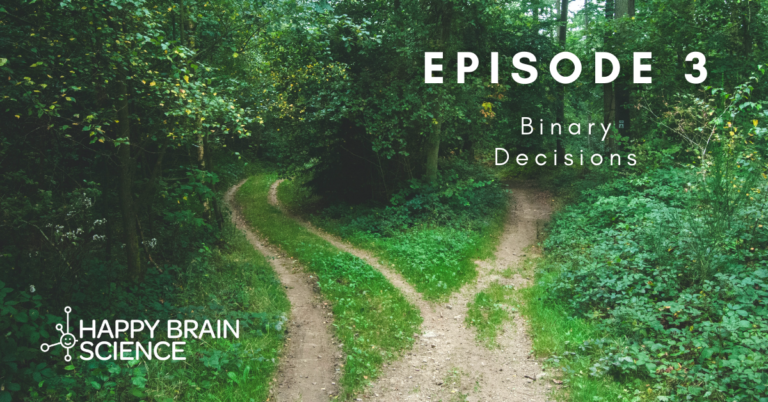
Why It’s Smart to Challenge Binary Decisions and Get Help
What are binary decisions, and why are they usually a bad idea? And what does asking for help have to do with psychological safety—the crucial feeling of shared trust that leads to great team performance?
Join us behind the scenes as Scott Crabtree, founder of Happy Brain Science, develops Choose Happiness @ Work Online—the online version of our popular card game! We’ve received many requests for a version to play with remote teams, and Scott is working to make that a reality! What challenges will he face? What obstacles will he overcome? And most importantly: how will he apply the science of happiness and engagement along the way? Welcome to the journey, where we’ll all find out together!
Episode #3: Should I or shouldn’t I? The wrong question!
Back to the question about binary decisions and why they often fail us. About a year ago, I met with my wonderful mastermind of fellow professional speakers. (A mastermind is a group of peers who coach and support each other.) We were sharing our annual plans, and I said I wanted to make good progress on developing Choose Happiness @ Work Online in 2020.
One of my peers asked, “Are you planning on programming the game yourself?”
“Yes,” I answered quickly. I explained that I’d led the development of video games for years and have many years of game programming experience.
He asked, “Is that a good idea?”
I argued that it was: I would have some time, I already had the experience and skills—I could do this.
In my mind, it was a binary choice: this or that, one or the other. I would develop the game myself, or I would outsource the development. To me, the path seemed clear: I would be the sole game developer.
Here I am, one year later, with a very simple Daily Happiness Boost version of Choose Happiness @ Work Online—but nothing more. I have all kinds of excuses, from the pandemic hitting to having the opportunity to do a lot of virtual presenting to Boeing and other organizations in 2020. But only in hindsight am I realizing that I fell into the trap of a binary decision.
Avoiding the binary decisions trap
Years ago, I read the wonderful research-based book by the Heath Brothers titled Decisive: How to Make Better Decisions in Life and Work. In that book, the authors argue that anytime we find ourselves asking, “Should I or shouldn’t I?” or “Option A or option B?” we are almost certainly not considering enough options. We make better decisions when we consider more possibilities.
Only recently did it occur to me that my choice wasn’t “develop the game entirely by myself” or “outsource the development of the game.” I had many other options in-between! To over-simplify, I had a third choice: “develop the game with help.”
I now realize that some version of this third option will undoubtedly be best. I want to be directly involved in the game’s development; I’ve got the interest and skill, it energizes me, and it will make me less dependent on “outsiders” to complete or modify the game.
But it’s also clear that help would be, well, helpful. I’ve done a lot of game programming in my life, but almost entirely single-player PC and Console games using C++, not multiplayer web games using Javascript.
I’m ready for some game programming help.
Why is it so hard to ask for help? What does asking for help have to do with psychological safety?
I’m not alone—many of us struggle to ask for help soon enough. And yet, as leaders, we should do that more often for a variety of reasons. One reason is we will make more progress sooner; I might have already launched Choose Happiness @ Work Online if I had secured help early in 2020.
The other reason leaders need to ask for help is to boost psychological safety in their organizations. Again, psychological safety is a shared feeling of trust—the belief that you can speak up about virtually anything at work without negative consequences. It’s vital for team performance.
Asking for help is one key way leaders can show that their organizations are safe places to take risks. If the boss is asking for help, then others can, too.
Let’s make psychologically safe progress together
I’m looking forward to asking for and getting help in developing Choose Happiness @ Work Online. I’m proud to be a leader who is willing to ask for help. Among other reasons, I know it will help my colleagues feel free to ask for help and speak up freely about whatever is on their mind. Together, we will all make more progress together.
Have you been framing things as binary decisions? Have you found it challenging to ask for help? As always, I’d love to read your thoughts and stories. Thanks for commenting below, connecting through any of our social media channels, or contacting me here.
Check out these related posts in our Choose Happiness @ Work Online series: